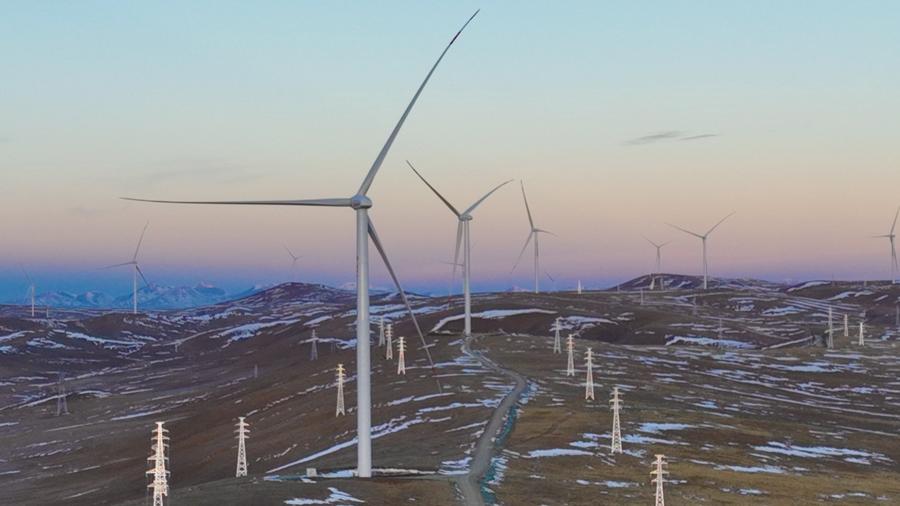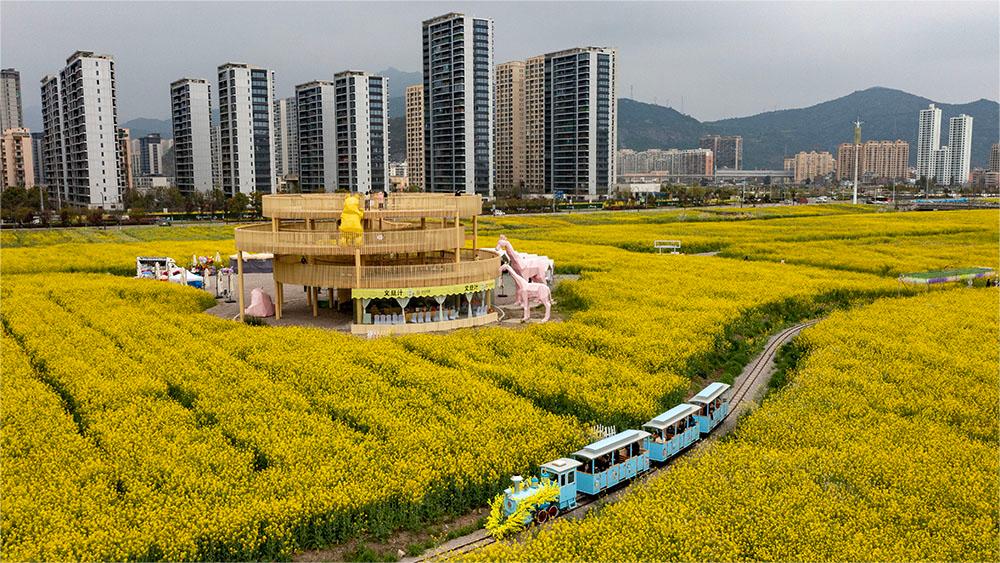China's energy-rich provinces embark on green, modern development path
*China's energy-rich provinces are experiencing a profound transformation in their industrial structure and energy mix as they strive for high-quality growth.
*Energy technology and related industries have become new growth drivers that propel industrial upgrading and promote the development of new quality productive forces.
*In 2023, China's installed renewable energy capacity surpassed its thermal power capacity for the first time in history and China accounted for over half of newly installed renewable energy capacity worldwide.
XI'AN, April 6 (Xinhua) -- Riding on a trackless rubber-tire vehicle, Du Huailong descended into a broad, brightly lit tunnel leading to the coalface of the Daliuta Coal Mine, operated by the Shendong Coal Group Co., Ltd. in northwest China's Shaanxi Province.
Reflecting on his 11 years in the industry, Du recalls the days when miners, with a helmet-mounted lamp and a shovel in hand, would make their way to the deep mineshaft on foot or a rickety small train.
This anecdote represents just one of many significant changes that have swept the mining industry in China over the years. Thanks to intelligent technology such as automated conveyor belts or coal-cutting machines, a single shift comprising just 13 workers can now extract 13,000 tonnes of coal, with per capita efficiency nearly doubling that of a decade ago, according to Du, a mining team leader.
Moreover, workers can remotely control the coal-cutting process at the click of a mouse. "The coal mining industry is no longer characterized solely by physical labor," noted Du.

A worker shows a mobile phone screen that displays real-time data collected from coalface area of the Daliuta Coal Mine operated by the Shendong Coal Group Co., Ltd. in northwest China's Shaanxi Province, Nov. 30, 2023. (Xinhua/Li Yibo)
China's energy-rich provinces are experiencing a profound transformation in their industrial structure and energy mix as they strive for high-quality growth. According to this year's government work report, in 2023, China's installed renewable energy capacity surpassed its thermal power capacity for the first time in history and China accounted for over half of newly installed renewable energy capacity worldwide.
At the same time, energy technology and related industries have become new growth drivers that propel industrial upgrading and promote the development of new quality productive forces.
TECH-EMPOWERED GREEN TRANSITION
Situated at the heart of the primary coal-producing regions of Inner Mongolia, Shanxi, and Shaanxi, Yulin City boasts a proven reserve of 152.7 billion tonnes of coal, along with abundant oil and natural gas resources.
However, despite its rich natural endowment, the city formerly relied heavily on the coal mining industry, resulting in environmental degradation and a simplistic industrial structure.
In recent years, coal companies in Yulin have made great efforts to transition to safe, intelligent, and environmentally friendly utilization of coal. At the YuLin Chemical Co., Ltd., a subsidiary of the Shaanxi Coal and Chemical Industry Group Co., Ltd., researchers have transformed coal into diverse products ranging from everyday items such as knives and forks to absorbable sutures for medical use.
"By expanding the industrial chain, we transform coal into chemical materials such as coal-based specialty fuels and biodegradable materials. This approach not only reduces carbon dioxide emissions but also adds additional value to our products," explained Zheng Baoxiang, vice president of YuLin Chemical.
To achieve China's dual carbon goals of peaking carbon emissions by 2030 and achieving carbon neutrality by 2060, Chinese energy enterprises widely employ carbon capture, utilization, and storage (CCUS) technology to reduce emissions.
At another Yulin-based coal chemical company owned by the Shaanxi Yanchang Petroleum Group Co., Ltd, captured and liquefied carbon dioxide is transported 150 km to the Xingzichuan oilfield for injection into oil layers approximately 1,300 meters underground.

An aerial drone photo taken on Dec. 1, 2023 shows a demonstration project for carbon capture, utilization, and storage (CCUS) by Shaanxi Yanchang Petroleum (Group) Co., Ltd. in Ansai District of Yan'an, northwest China's Shaanxi Province. (Xinhua/Li Yibo)
"The carbon dioxide generated from the coal chemical process is injected underground in place of water, combining oil recovery with carbon sequestration, achieving both water conservation and carbon reduction," said Mei Yan, a technician at the oilfield.
According to a report released last year by several institutions including Tsinghua University, incomplete statistics show that China has nearly 100 planned or operational CCUS projects, with over half already operational. These projects have a combined carbon dioxide capture capacity of four million tonnes per year, among which two million tonnes can be injected underground.
GREEN ENERGIES POWERING THE FUTURE
Facing a series of challenges including immense demand, China has been accelerating the construction of a renewable energy system to enhance its capability to ensure national energy supply.
In southwest China's Xizang Autonomous Region, the Tsomey Drigu wind farm, located in Shannan City, is the highest in the world with an altitude of over 5,000 meters. With a single-unit capacity of 3.6 megawatts, the wind turbines are equipped with 90-meter-high hubs and gigantic blades 160 meters in diameter. "They can work through severe conditions like strong ultraviolet light and low temperature," said Wang Yang, head of the wind farm.
From the end of 2021 to January 2024, the cumulative grid-connected electricity generated by the wind farm exceeded 214 million kWh. This amount of electricity can meet the annual power consumption needs of nearly 140,000 households in the surrounding area, which is equivalent to reducing carbon dioxide emissions by 160,000 tonnes.
Qinghai Province in northwest China has been taking advantage of its abundant solar energy resources to develop a photovoltaic industry, turning vast deserts into "blue oceans" of solar panels.
Due to the regular washing of the panels positioned approximately 1.5 meters above the ground, lush grass thrives underneath, drawing sheep from neighboring areas to graze there each summer, resulting in a distinctive and harmonious landscape.
By the end of 2023, the installed capacity of renewable energy in Qinghai had reached about 51.1 million kW, accounting for 93 percent of the total installed capacity.

An aerial drone photo taken on Dec. 31, 2023 shows a large-scale wind power project in Nagqu City, southwest China's Xizang Autonomous Region. (Lin Yongqiu/CHN Energy Xizang Power Company Limited/Handout via Xinhua)
Also abundant in water resources, Qinghai has started building pumped-storage power stations, which use off-peak electricity to pump water to higher locations, where it is stored and then released to generate electricity when the power supply is strained.
In August 2023, construction of the Warang pumped-storage power station, the first of its kind in Qinghai, broke ground in Guinan County with an installed capacity of 2.8 million kW. The province has planned to build over 10 such facilities in the coming years.
"Pumped storage power stations provide currently the most effective and mature energy storage method. One million kW of pumped storage capacity can support the generation of four million kW of new energy," said Li Haifeng, chairman of the Warang pumped-storage co., ltd.
Photos
 Migratory birds spotted in Karamay, NW China's Xinjiang
Migratory birds spotted in Karamay, NW China's Xinjiang Tourist-dedicated New Orient Express gears up to offer luxury train travel around NW China's Xinjiang
Tourist-dedicated New Orient Express gears up to offer luxury train travel around NW China's Xinjiang Spectacular sea of blooming rapeseed flowers attracts tourists to Yueqing, E China's Zhejiang
Spectacular sea of blooming rapeseed flowers attracts tourists to Yueqing, E China's Zhejiang Rare bird species spotted in north China's grassland
Rare bird species spotted in north China's grassland
Related Stories
- Letter from China: Earth Hour: Lights off, green action on
- High-altitude Maerdang Hydropower Station in Northwest China starts operation
- Chinese clean energy firms continue overseas expansion amid challenges, opportunities
- China commits to establishing region-specific environmental management system by 2025
- Chinese scientists design device to produce hydrogen from renewable sources
- Green products seen during Boao Forum
Copyright © 2024 People's Daily Online. All Rights Reserved.





